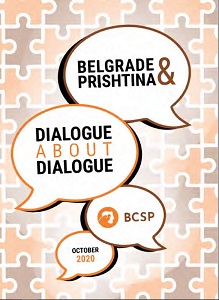Belgrade and Prishtina: Dialogue about the Dialogue
Belgrade and Prishtina: Dialogue about the Dialogue
Author(s): Author Non Specified
Subject(s): Politics / Political Sciences, Politics, International relations/trade
Published by: BCBP Beogradski centar za bezbednosnu politiku
Summary/Abstract: 2020 has been marked by the outbreak of the COVID-19 pandemic, which has impacted all aspects of life, from our daily routines to international politics. The pandemic has also had an effect on Belgrade-Prishtina relations, serving as a pretext for the fall of the Kosovo Government led by Albin Kurti at the end of March 2020. One of the first moves by the new Government of Kosovo, headed by Avdulah Hoti, was to withdraw the measures of so-called reciprocity with Serbia, introduced by their predecessors. This meant the removal of the formal barrier to the continuation of the dialogue with Serbia, which had been deadlocked since the end of 2018. The dialogue indeed revived – on multiple tracks. Presidents Vučić and Thaçi were invited to a White House meeting on June 27, which was followed by speculation that the meeting would result in Serbia recognizing Kosovo’s independence. However, the Hague-based Kosovo Specialist Chambers filed an indictment against Thaçi, charging him with a range of crimes against humanity and war crimes committed during Kosovo war, and the White House meeting was cancelled. On the other hand, the Brussels Dialogue between Belgrade and Prishtina resumed shortly afterwards, at both the high political level and the so-called expert level. A number of meetings took place from July to September in which a range of issues were discussed, including economic cooperation, missing and displaced persons, the status of minority communities and mutual financial claims between Kosovo and Serbia. The postponed White House meeting eventually took place on September 3 and 4.The documents signed in Washington were described as “historic”, primarily by Trump’s administration, but also by President Vučić and the media under his control. However, the content of the documents suggests that we cannot talk about significant progress in the normalization of relations between Belgrade and Prishtina. Still, the intensified involvement of the United States in this process remains a fact and, against this background, four think tankers and journalists from Belgrade, Brussels, Prishtina and Washington will seek to discuss the following questions: How will the US presidential election scheduled for November 3 affect US involvement in the dialogue between Kosovo and Serbia? What resources does the EU have at its disposal to encourage the two sides to reach a comprehensive agreement? How will internal political change in Serbia and Kosovo – or the lack of it – affect the dialogue? How will the conflicting interests of the US, the EU, Russia and China affect the domestic political situation in Kosovo and Serbia, and consequently the normalization process? What is a feasible solution for future relations between Kosovo and Serbia?
Series: Beogradski Centar za Bezbednosnu Politiku - POLICY PAPERS
- Page Count: 14
- Publication Year: 2020
- Language: English
- Content File-PDF

